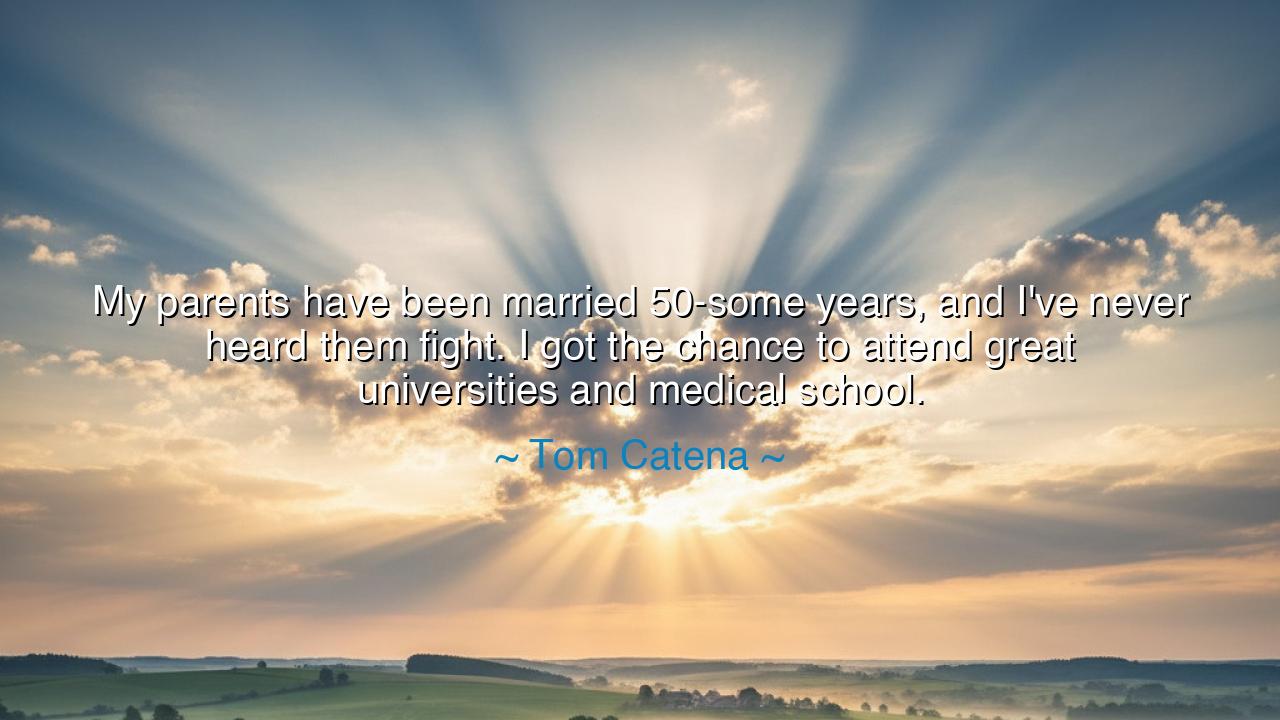
My parents have been married 50-some years, and I've never heard
My parents have been married 50-some years, and I've never heard them fight. I got the chance to attend great universities and medical school.






Hear the words of Tom Catena, physician and servant of the poor, who has spent his life as the lone doctor in the Nuba Mountains of Sudan: “My parents have been married 50-some years, and I've never heard them fight. I got the chance to attend great universities and medical school.” At first these words seem modest, simple as a childhood memory. Yet within them lies the deep foundation of a life devoted to service. He speaks of two gifts: the harmony of family and the privilege of education. Together, they formed the soil from which his vocation sprang forth.
The origin of this statement is his own life, shaped by the quiet strength of his parents’ union. A household of peace does more than keep tempers low—it molds the heart of a child. To grow in a home where conflict is rare and respect is constant is to learn the language of patience, gentleness, and trust. From such roots, Catena gained the inner calm to face hardship, and the resilience to endure loneliness and suffering in foreign lands. His words remind us that the virtues we witness in the home are the virtues we carry into the world.
The second gift he names is the chance to study at great universities and medical school. This was no entitlement, but a blessing. Education, especially in the healing arts, is both rare and sacred. In ancient times, the secrets of medicine were guarded closely, handed down only to chosen apprentices. To be entrusted with such knowledge was to be given not only a profession but a sacred duty. Catena, shaped by both family and schooling, stands as the heir to this lineage: a physician whose skills were born from privilege, yet poured out in service to those who have nothing.
History offers us parallels. Consider the story of Albert Schweitzer, the great humanitarian who left behind comfort and recognition in Europe to serve as a physician in Africa. Like Catena, his path was built upon strong foundations—an upbringing filled with music, faith, and discipline, and an education in both theology and medicine. These gifts, when joined with his will to serve, allowed him to endure hardships for the sake of others. The lesson is clear: when fortune grants us peace and education, we must transform these blessings into works of compassion.
The meaning of Catena’s words is not boast but gratitude. He does not claim superiority because of his upbringing; he acknowledges the fortune of it. His family’s harmony gave him emotional strength, his education gave him intellectual tools, and together they prepared him for the calling of his life. Yet he also implies a truth for all: the blessings we receive, whether peace at home or opportunities abroad, are not meant to be hoarded. They are given that we might go forth and serve.
The lesson for us is this: honor the foundations from which you come. If you were raised in peace, let that peace guide you in conflict. If you were educated in privilege, let that privilege become a weapon against ignorance and suffering. Even if your origins were not so blessed, you can create such foundations for others—by fostering harmony in your own family, by investing in the education of the young, by offering encouragement where once you lacked it.
Practical action follows: cultivate peace in your homes, for in such soil future generations are formed. Support education not only for yourself but for others, especially those denied opportunity. And when you achieve, look back with gratitude to the roots that sustained you, whether family or mentors, and repay their gift through service.
Thus Catena’s words, spoken with humility, become more than memory; they are a teaching. They remind us that the blessings of family and education are not ends in themselves, but beginnings of responsibility. Let us, then, carry forward this wisdom: that from peace comes strength, from education comes duty, and from gratitude comes service. For in living this way, we honor not only our parents and teachers, but also the generations yet to come.






AAdministratorAdministrator
Welcome, honored guests. Please leave a comment, we will respond soon